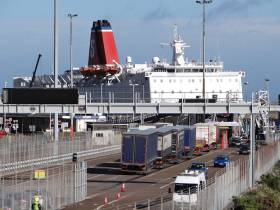Displaying items by tag: Port of Fishguard
What Could Leaving EU Mean for Port of Fishguard? - Post Brexit
#FerryNews - Of all the stories that have come out of Brexit and Wales, the impact or otherwise on the country's port links with Ireland has been one of the biggest.
Wales so writes BBC News, has three ports that link Great Britain to Ireland, with warnings of long queues if, as a result of whatever Brexit negotiations produce, customs and border checks are needed.
One port, Holyhead, has had much written about it - with concerns new checks could result in delays and disrupt its business model.
But the smaller Port of Fishguard in Pembrokeshire, with its own roll-on, roll-off service, has also been a focus of some concerns.
- 'Free ports' urged to boost business
- Holyhead 'extra-complexity' post-Brexit
- Concern about Holyhead port
- 'Danger' to Welsh ferry ports
An assembly committee report last year found 100,000 lorries were carried to Ireland via ports in Pembrokeshire in 2015 - a third of those through Fishguard.
The UK government said it did not want a so-called "hard border" with Ireland and it is unclear what, if any, impact the final Brexit settlement would have on Wales' ports.
Jeremy Martineau, secretary of the Fishguard and Goodwick Chamber of Trade, said the organisation, which has 140 members, does not have a view on Brexit.
But asked what he thought personally about the impact of leaving the EU on the town, the Remain voter said: "It depends on what happens with the Ireland/Northern Ireland border."
He feared border checks would deter commercial traffic from using the link - something he said was more significant than passenger traffic - and was concerned about direct routes from Ireland to the continent being developed.
For further reading on the story click here.





























































